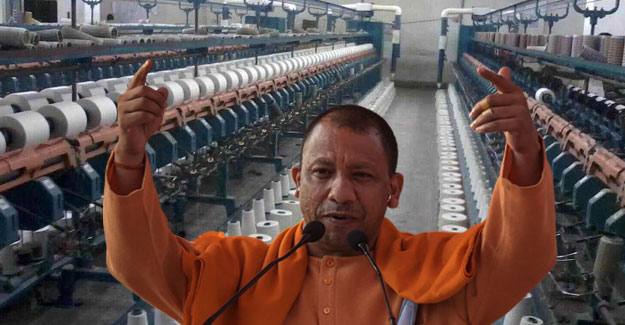- The Uttar Pradesh Textile and Apparel Policy was approved in a meeting of the Uttar Pradesh Cabinet chaired by Chief Minister Yogi Adityanath on October 13, 2022.
- An employment oriented that aims to attract fresh investment of Rs 10,000 crore and create over 5 lakh new jobs.
- The main objective of the new policy is to establish the state as a global level sustainable textile and apparel manufacturing hub.
- To make the policy investor friendly, several processes have been made online and a help desk has been set up for the convenience of investors.
The Uttar Pradesh (UP) government has announced that it would provide a 25% subsidy on purchase of land and up to 100% exemption on stamp duty for setting up textile units in the state as part of its new policy.
The move comes across as an effort to attract Rs 10,000 crore investment for the textile sector to turn the state into a global textiles hub. “Making the state as the global textile hub, attracting Rs 10,000 crore investment and generating 5 lakh jobs are the main focus of this new policy,” UP Handloom and Textile Industry Minister Rakesh Sachan said. He informed that the government issued an official order for the new Textile and Garments Policy 2022.
The new textile policy will offer a 25% subsidy on the purchase of land from industrial development authorities or other development authorities in UP for setting up textile units.
The rule would be applicable in all districts except Gautam Budh Nagar in Noida, where the subsidy would be 15%. At the same time, the subsidy would be limited to 10% of the total cost of the project. However, the subsidy would be given only when the textile unit starts production within five years of purchase of land.
The minister said 1,000-acre textile parks will be developed in Lucknow and Hardoi districts under the Prime Minister Mitra Park scheme and the land for the project has been identified.
“Except Gautam Budh Nagar, textile and garment units set up in all districts would get 100% exemption from stamp duty. In Gautam Budh Nagar, textile units would receive 75% exemption. Meanwhile, textile parks being established under the PM Mitra Park schemes would get 100% exemption from stamp duty but private developers would get 50% exemption on stamp duty,” he added.
An incentive has been earmarked for the developers of textile parks under the PM Mitra scheme – a subsidy of Rs 2 per kilovolts in the electricity tariff would be provided to them for five years, subject to a maximum of Rs 60 lakh per year per textile park. Keeping employment as top priority, the power subsidy would be given on the condition that the textile park provide remuneration to a minimum of 50 people.
Giving a boost to silk production in the state, the policy also offers 100% stamp duty exemption on setting up silk production and threading units. Not just that, it also offers a capital subsidy, which includes a 25% subsidy for purchase of plant and machinery for textile and garment units.
The units that will be set up in Bundelkhand and Purvanchal region would be able to avail an additional 10% capital subsidy, although the subsidy amount has a maximum cap of Rs 100 crore per unit.
Besides, the policy also offers financial assistance to investors in development of infrastructure for their units. In fact, for units being developed on undeveloped land, the government would provide 50% reimbursement on the cost of development of water pipelines, electricity lines, affluent plants, roads etc upto maximum of Rs 3 crore per unit.
Further, the new textile and garment units would also get 100% exemption on electricity duty for the period of 10 years.




 textileexcellence
textileexcellence 







